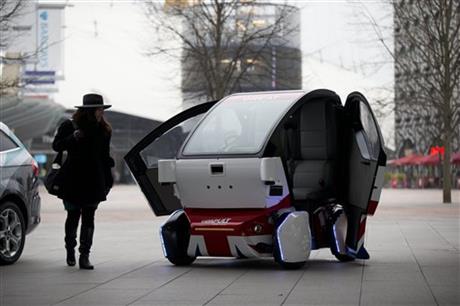Driverless cars are hitting Britain’s public roads for the first time, giving a glimpse of future travel that’s billed as safer and more efficient.
Britain unveiled four prototype self-drive cars Wednesday, launching the country’s first public trials ahead of a series of planned rule reviews to accommodate the new technology.
Officials showed off four types of autonomous vehicles under trial, including a shuttle that looks like a larger golf cart and a compact two-seater “pod.” Journalists took short rides on the shuttle, which zipped around a public square outside central London’s O2 Arena as curious pedestrians looked on.
The project was “still in the early days,” Transport Minister Claire Perry said, but she added the new technology has the potential to make roads safer and attract global investment.
Britain has ambitions to lead development in driverless cars, which are also being tested in U.S. cities by companies including Google. Auto companies from Mercedes-Benz to Nissan are also developing self-drive vehicles, though most are not ready to go on public roads and highways commercially.
Regulation and legal changes are a major hurdle. Officials say fully driverless cars are unlikely to be used on British roads until 2030.
Britain’s government, which is spending 19 million pounds (US$29 million) on four trial centers around the country, says it will amend and review domestic road regulations by 2017. One focus will be on establishing liability when a self-drive car crashes.
“Until that key concern is clarified, probably by statute, many drivers will remain wary of ‘driverless’ driving,” said Edmund King, president of drivers’ organization AA.
The next immediate step is for officials to publish guidelines for companies to test the cars in “real-life scenarios” on roads — including highways — by this summer. Qualified drivers will be riding in the cars, ready to take control should anything go awry.
In Germany, which is also pushing for more automated driving, officials have designated a busy stretch of highway — a Bavarian stretch of the A9 autobahn connecting Munich and Berlin — for the testing of systems that measure and transmit to cars such conditions as ice, heat and potholes.
That stretch will eventually be able to handle driver-assistance systems and then fully automated vehicles, the ministry for transport and digital infrastructure said.
___
Associated Press writer David McHugh contributed to this story.




